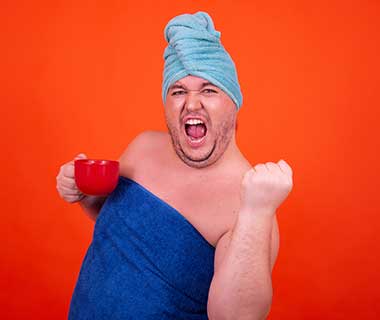Coffee, the world’s go-to pick-me-up, can ironically make some people feel more tired than energized. So, what’s going on? How can caffeine, a stimulant, lead to feelings of fatigue?
Let’s dive into the surprising reasons why coffee might make you sleepy.
1. The Caffeine Crash
Caffeine is notorious for providing a quick energy boost, but it’s also linked to a phenomenon known as the "caffeine crash." Here’s how it works: caffeine temporarily blocks a neurotransmitter called adenosine. Adenosine is what makes you feel sleepy as it builds up in your brain throughout the day. By blocking adenosine, caffeine makes you feel more alert.
However, this effect is short-lived. Once the caffeine wears off, the adenosine that was being blocked floods your system all at once. This sudden influx of sleepiness can leave you feeling even more tired than before you had your coffee. This post-caffeine crash is one of the most common reasons coffee might make you feel sleepy.
2. Dehydration
While coffee is a liquid, it acts as a mild diuretic, meaning it makes you urinate more frequently. This can lead to dehydration, especially if you’re not drinking enough water throughout the day. When you’re dehydrated, your body can feel sluggish, and that sense of fatigue can overshadow any stimulating effects of caffeine.
When you’re dehydrated, your blood pressure may drop, reducing the efficiency of your body’s oxygen and nutrient delivery system. Less oxygen = more yawns. So, if you’re sipping on coffee without hydrating, it might leave you feeling tired rather than energized.
3. Blood Sugar Levels
Coffee can affect blood sugar levels in different ways. For some people, especially those sensitive to caffeine, coffee can lead to spikes and dips in blood sugar. When your blood sugar drops after a spike, you may feel sluggish, tired, or even sleepy.
This effect is more pronounced if you drink your coffee with sugary syrups, creamers, or other sweeteners. The sugar rush provides a quick hit of energy, but when your body processes it and your blood sugar drops, you’re left feeling tired and in need of another energy boost.
4. Tolerance and Sensitivity to Caffeine
Your body’s relationship with caffeine changes the more often you consume it. Regular coffee drinkers may build up a tolerance over time, meaning that the stimulating effects of caffeine are less noticeable. Instead of getting that much-needed energy boost, you may feel like the coffee isn’t “working,” leading to a sense of fatigue.
On the other hand, some people are more sensitive to caffeine, and it may affect them differently. For instance, caffeine can cause a mild stress response in the body by triggering the release of adrenaline. While adrenaline might make some people feel alert, for others, it can lead to feelings of fatigue or nervousness, making them feel more drained than energized.
5. The Timing of Your Coffee
Believe it or not, when you drink your coffee can have a big impact on how it makes you feel. Drinking coffee too late in the day, or even at times when your body naturally expects rest, like mid-afternoon or evening, can lead to feelings of drowsiness. Your body follows a natural circadian rhythm, which dictates your energy levels throughout the day. Consuming coffee at a time when your body expects a drop in energy might leave you feeling sleepy rather than stimulated.
Additionally, some people experience the "afternoon slump" as part of their natural circadian rhythm. During this time, you might reach for coffee to keep going, but if the caffeine doesn’t hit fast enough, you may find yourself feeling even more tired due to the timing mismatch.
6. Underlying Sleep Issues
Lastly, coffee can mask an underlying issue: lack of sleep. If you’re not getting enough rest, no amount of caffeine will make up for your body’s need for sleep. In fact, drinking more coffee can exacerbate the problem by masking your tiredness temporarily, leading you to crash harder once the caffeine wears off.
Caffeine can also interfere with your sleep quality, especially if consumed later in the day. If you’re drinking coffee too close to bedtime, it may reduce the amount of deep, restorative sleep you get at night, leading to a cycle of waking up tired and relying on more coffee to get through the day.
So, What Can You Do?
If coffee consistently leaves you feeling more tired than awake, consider these tips to get more out of your cup:
- Hydrate: Drink plenty of water to avoid dehydration.
- Limit sugar: Avoid sugary coffee drinks that could lead to blood sugar crashes.
- Time it right: Drink your coffee earlier in the day to avoid disrupting your sleep cycle.
- Take breaks: Give your body a break from caffeine to reset your tolerance.
- Get enough sleep: No amount of coffee can replace a good night’s rest.









